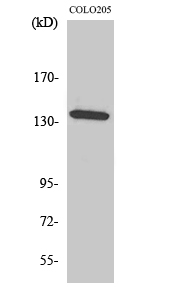
| WB | 咨询技术 | Human,Mouse,Rat |
| IF | 咨询技术 | Human,Mouse,Rat |
| IHC | 1/50-1/100 | Human,Mouse,Rat |
| ICC | 1/50-1/200 | Human,Mouse,Rat |
| FCM | 咨询技术 | Human,Mouse,Rat |
| Elisa | 1/10000 | Human,Mouse,Rat |
| Aliases | ALPK1; KIAA1527; LAK; Alpha-protein kinase 1; Chromosome 4 kinase; Lymphocyte alpha-protein kinase |
| Entrez GeneID | 80216 |
| WB Predicted band size | Calculated MW: 139 kDa; Observed MW: 139 kDa |
| Host/Isotype | Rabbit IgG |
| Antibody Type | Primary antibody |
| Storage | Store at 4°C short term. Aliquot and store at -20°C long term. Avoid freeze/thaw cycles. |
| Species Reactivity | Human,Mouse |
| Immunogen | The antiserum was produced against synthesized peptide derived from human ALPK1. AA range:11-60 |
| Formulation | Purified antibody in PBS with 0.05% sodium azide,0.5%BSA and 50% glycerol. |
+ +
以下是3篇与ALPK1抗体相关的研究文献概览(截至2021年):
1. **文献名称**: *ALPK1 missense pathogenic variant in ROSAH syndrome epigenetically dysregulates α-kinase signaling*
**作者**: Williams KB et al. (2021)
**摘要**: 研究揭示了ALPK1基因突变在ROSAH综合征中的作用,通过Western blot和免疫荧光技术使用ALPK1抗体,发现突变导致NF-κB信号通路异常激活,提示ALPK1在调控先天免疫中的关键功能。
2. **文献名称**: *ALPK1 regulates streptococcal-induced inflammation via interaction with TRAF2*
**作者**: Zhou Q et al. (2019)
**摘要**: 该研究利用ALPK1特异性抗体进行免疫共沉淀实验,证明ALPK1通过结合TRAF2蛋白介导链球菌感染后的炎症反应,为ALPK1在细菌感染中的促炎机制提供了证据。
3. **文献名称**: *Autoantibodies against ALPK1 in patients with chronic kidney disease: a novel biomarker*
**作者**: Tanaka H et al. (2018)
**摘要**: 通过ELISA和蛋白质芯片技术检测到慢性肾病患者血清中存在抗ALPK1自身抗体,提示ALPK1可能成为自身免疫性肾病的新型生物标志物,研究使用了多克隆ALPK1抗体进行抗原验证。
*注:若需具体文献链接或补充DOI号,可进一步说明。*
The ALPK1 (Alpha-Protein Kinase 1) antibody is a tool used to study the ALPK1 protein, a serine/threonine kinase implicated in innate immunity, inflammatory responses, and metabolic disorders. ALPK1 is evolutionarily conserved and structurally characterized by an N-terminal kinase domain and a C-terminal regulatory region. It plays a critical role in sensing bacterial metabolites, such as ADP-heptose, which triggers NF-κB and MAPK signaling pathways, leading to pro-inflammatory cytokine production. Dysregulation of ALPK1 has been linked to diseases like chronic kidney disease, gout, and certain cancers. For instance, ALPK1 variants (e.g., T237M) are associated with increased susceptibility to chronic kidney disease in East Asian populations.
ALPK1 antibodies are essential for detecting protein expression, localization, and activation in cell lines, tissues, or animal models. They are utilized in techniques like Western blotting, immunohistochemistry, and immunofluorescence. Polyclonal and monoclonal antibodies are available, with specificity validated via knockout controls. Researchers also employ ALPK1 antibodies to study its interaction with downstream effectors (e.g., TRAF2) or phosphorylation events. Recent studies highlight its role in NLRP3 inflammasome activation, connecting ALPK1 to gout pathogenesis. As ALPK1 gains attention in metabolic and immune research, reliable antibodies remain crucial for exploring its therapeutic potential.
×